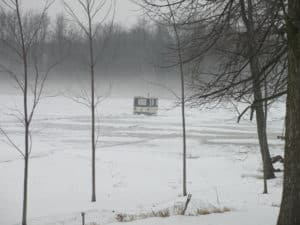On this Fifth Week of Ordinary Time, we share a Franciscan Gospel reflection and questions taking place by a lake written by Fr. Paul Gallagher, OFM. They are edited by Franciscan Sister of Christian Charity Sister Anne Marie Lom and Joe Thiel. The excerpts from the Sunday readings are prepared by Joe Thiel. To read or download the complete pdf with excerpts for your prayer, please click here: Franciscan Gospel Reflection February 10 2019. Excerpts are from the Lectionary for Mass for Use in the Dioceses of the United States of America, second typical edition © 2001, 1998, 1997, 1986, 1970 Confraternity of Christian Doctrine, Inc., Washington, DC. Used with permission. All rights reserved. No portion of this text may be reproduced by any means without permission in writing from the copyright owner. Please include this information when printing.
Photos: fishing shanty on Silver Lake near Franciscan Sisters of Christian Charity Motherhouse
Luke 5:1-11
While the crowd was pressing in on Jesus and listening to the word of God, he was standing by the Lake of Gennesaret. He saw two boats there alongside the lake; the fishermen had disembarked and were washing their nets. Getting into one of the boats, the one belonging to Simon, he asked him to put out a short distance from the shore. Then he sat down and taught the crowds from the boat.
After he had finished speaking, he said to Simon, “Put out into deep water and lower your nets for a catch.” Simon said in reply, “Master, we have worked hard all night and have caught nothing, but at your command I will lower the nets.” When they had done this, they caught a great number of fish and their nets were tearing. They signaled to their partners in the other boat to come to help them. They came and filled both boats so that they were in danger of sinking. When Simon Peter saw this, he fell at the knees of Jesus and said, “Depart from me, Lord, for I am a sinful man.” For astonishment at the catch of fish they had made seized him and all those with him, and likewise James and John, the sons of Zebedee, who were partners of Simon. Jesus said to Simon, “Do not be afraid; from now on you will be catching men.” When they brought their boats to the shore, they left everything and followed him.
Background
The text for last Sunday’s gospel ended with the people of Nazareth wanting to throw Jesus headlong over the hill on which their town had been built. (4:29-30) In the remaining verses of that chapter, Luke describes Jesus’ visit to Capernaum, where he cures a man possessed by a demon. His teaching astonishes the people, because he speaks with authority. Jesus then goes to Simon’s house and cures Simon’s mother-in-law. After sunset, with the Sabbath officially over, people bring their sick for him to cure. Before daybreak the next morning, Jesus leaves Capernaum and seeks out a deserted place. The crowds find him and try to prevent him from leaving. In Mark’s gospel, Peter is the one who tries to prevent Jesus from leaving (Mark 1:36-37). As Luke describes the incident, it is the people themselves who ask Jesus not to leave. This small shift avoids having Peter in the difficult position of trying to prevent Jesus from doing what he knows he must do.
Matthew also, as well as Mark, records this event in Jesus’ ministry. Both of them place it at the very beginning of Jesus’ public ministry, right after Jesus returns from the desert (Matt 4:18-22 and Mark 1:16-20). They also report that Simon’s brother Andrew was also in the boat–a detail that Luke omits. Luke’s description places the emphasis on Peter’s unique relationship with Jesus.
Luke’s account also makes more intelligible the response of Peter, James, and John to Jesus’ invitation to leave their way of life to become fishers of men. For these early disciples to leave their families, professions, and property to become disciples of Jesus would have amounted to a total disregard for their responsibilities as men of the day for the protection and survival of their families. While such a total commitment might play well in a Hollywood movie, it would be scandalous to the values of the day. Matthew’s and Mark’s descriptions, at the very beginning of Jesus’ public ministry, suggest that the disciples had little or no prior exposure to Jesus and his teaching before they became followers. Luke’s placement of this story within his gospel indicates that Peter had prior personal experience of Jesus, teaching in the synagogue and healing his own mother-in-law and others. And in this text Peter also experiences Jesus as one who can bring about a catch of fish that leaves Peter speechless.
We bring our focus now back to the account in Luke that is our gospel text for Sunday. Gennesaret is in a fertile area near the northern part of the Sea of Galilee. Night fishing is there known to yield great catches. Throughout most of the text, Peter is referred to by his Jewish name, Simon. The exception is verse 8, when he realizes the size of the catch of fish and attributes it to divine power of God working through Jesus. All Peter can do is kneel before Jesus and ask him to depart. Such a gesture is very meaningful in this culture. Jesus is someone who has abilities that Peter does not. Being a disciple of Jesus requires personal sacrifice. Here Jesus calls him “Simon-Peter,” both his Jewish name and the name that Jesus will give him later in the text when Jesus names his apostles (Luke 6:14).
There is likewise a shift in how Simon addresses Jesus in the text. When Jesus asks Simon to put out into the water and lower his net, Simon calls Jesus “Master” or “Rabbi.” After the experience of the catch of fish, Peter refers to Jesus as “Lord.” All those present, not just Peter, recognize the manifestation of divine power in what has taken place. They are filled with astonishment and fear, the typical response to the near presence of God. Jesus reassures them with the exhortation, “Do not be afraid!” (v. 10) Usually when people are reassured with the greeting, “Do not be afraid,” it signals more than reassurance. God is commissioning those involved in the encounter. God has not acted in an extraordinary way just to brighten the day for some weary fishermen. In the second part of verse 10, Jesus tells Simon, James, and John that from now on they will be fishers of men. Luke indicates that the commissioning extends beyond James and John by stating that they left their boats and they followed Jesus.
Reflection Questions
1. Have you ever chosen to leave a secure relationship or good job? What did it take for you to leave the situation and move on? How difficult was it?
2. What might have been Peter’s state of mind and body as he sat cleaning his nets, listening to Jesus?
3. What are some of the possible responses Peter could have given to Jesus’ request to lower his nets?
4. Peter understood the catch of fish as a sign of God acting in his life. What are some of the factors in this incident that helped Peter see the presence of God at work at this moment in his life?
5. Are there times in your life where you believe that the presence of God was at work in powerful ways in your own life? Are there any parallels from your experience to what is recorded here in this incident?
6. Jesus reassures Peter, “Do not be afraid.” What kind of fear do you think Peter was experiencing?
7. Do you ever feel like you are looking for the “boatload of fish” rather than the overwhelming presence of God?
8. Have you ever had an experience that left you feeling like Simon when he told Jesus, “Get away from me for I am sinful?” Do you desire an experience of God’s closeness in your life? Do you think you are ready to deal with the consequences of such an experience?
9. Would this account have been written if Peter and the others had thanked Jesus profusely, shared some of their fish with the needy of their community, and told the story at every family gathering, but continued for the rest of their lives to be fishermen?
10. What is the good news for you in this text?




